Related Research Articles
The year 1914 in film involved some significant events, including the debut of Cecil B. DeMille as a director.
The Nikkatsu Corporation is a Japanese entertainment company known for its film and television productions. The name Nikkatsu amalgamates the words Nippon Katsudō Shashin, literally "Japan Motion Pictures".

Teinosuke Kinugasa was a Japanese filmmaker and actor. His best-known films include the silent avant-garde films A Page of Madness and Crossroads and the Academy Award-winning historical drama Gate of Hell.
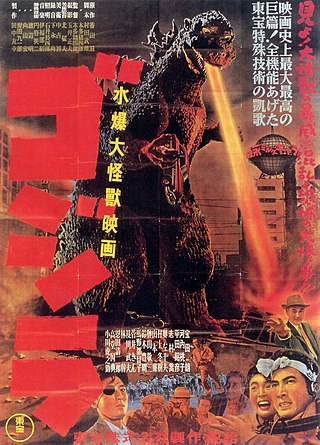
Tokusatsu is a Japanese term for live-action films or television programs that make heavy use of practical special effects. Credited to special effects director Eiji Tsuburaya, tokusatsu mainly refers to science fiction, war, fantasy, or horror media featuring such technology but is also occasionally dubbed a genre itself. Its contemporary use originated in the Japanese mass media around 1958 to explain special effects in an easy-to-understand manner and was popularized during the "first monster boom" (1966-1968). Prior to the monster boom, it was known in Japan as Tokushu gijutsu or shortened Tokugi.
Samuel Goldwyn Productions was an American film production company founded by Samuel Goldwyn in 1923, and active through 1959. Personally controlled by Goldwyn and focused on production rather than distribution, the company developed into the most financially and critically successful independent production company in Hollywood's Golden Age.

Masayoshi Ueki, known professionally as Chiezō Kataoka, was a Japanese film and television actor most famous for his starring roles in jidaigeki.
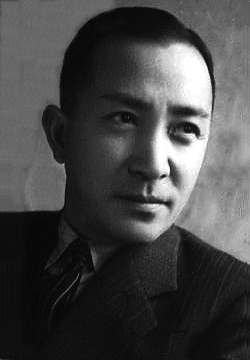
Tsumasaburō "Bantsuma" Bandō was one of the most prominent Japanese actors of the twentieth century. Famous for his rebellious, sword fighting roles in many jidaigeki silent films, he rose to fame after joining the Tōjiin Studio of Makino Film Productions in Kyoto in 1923.

Matsunosuke Onoe, sometimes known as Medama no Matchan , was a Japanese actor. His birth name is Tsuruzo Nakamura. He is sometimes credited as Yukio Koki, Tamijaku Onoe, or Tsunusaburo Onoe, and as a kabuki artist he went by the name Tsurusaburo Onoe. He gained great popularity, appearing in over 1,000 films, and has been called the first superstar of Japanese cinema.
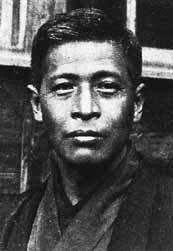
Shōzō Makino was a Japanese film director, film producer and businessman who is regarded as a pioneering director of Japanese film. In addition, all four of his sons, including Masahiro Makino and Sadatsugu Matsuda, went into the film business as either directors or producers, and his grandchildren include the actors Masahiko Tsugawa and Hiroyuki Nagato. Actress Yoko Minamida is a granddaughter-in-law.
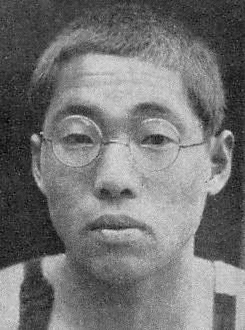
Shozo Makino was a Japanese Olympic swimmer. He won a silver medal for the Men's 1500 meter freestyle event in the 1932 Summer Olympics in Los Angeles, and a bronze medal for the Men’s 400 meter freestyle event in the 1936 Summer Olympics in Berlin.

Hiroyuki Nagato, stage name of Akio Kato (加藤晃夫), was a Japanese actor.

Masahiro Makino was a Japanese film director. He directed more than 260 films, primarily in the chanbara and yakuza genres. His real name was Masatada (正唯), but he took the stage name Masahiro, the kanji for which he changed multiple times.

Chūkon giretsu: Jitsuroku Chūshingura is a 1928 Japanese black-and-white silent film with benshi accompaniment directed by Shozo Makino. It was an epic created to commemorate Makino's 50th birthday and is based on the classic theme of the Chūshingura. During the production of this film, a fire broke out, destroying parts of the original film, but it has since been restored.
Sadatsugu Matsuda was a Japanese film director. He directed films from 1925 to 1969.

Fuji Yahiro was a Japanese screenwriter, mostly of chanbara films. His real name was Minoru Yahiro. Leaving Meiji University before graduating, he began writing screenplays at Shōzō Makino's Makino Film Productions in 1927. He ended up penning hundreds of screenplays at many studios, such as Teikine, Shinkō Kinema, and Daiei. He also participated in the "Narutakimura" group, writing screenplays with Sadao Yamanaka, Hiroshi Inagaki, Eisuke Takizawa and others. He also wrote many books and received the Order of the Rising Sun in 1975.

Utaemon Ichikawa was a Japanese film actor famous for starring roles in jidaigeki from the 1920s to the 1960s. Trained in kabuki from childhood, he made his film debut in 1925 at Makino Film Productions under Shōzō Makino. Quickly gaining popularity, he followed the example of Makino stars such as Tsumasaburō Bandō in starting his own independent production company, Utaemon Ichikawa Productions, in 1927. It was there he first began the "Idle Vassal" series, which would become his signature role. When his company folded in 1936 as sound film came to the fore, he moved to Shinkō Kinema and then Daiei Studios before helping form the Toei Company after World War II. He served on the board of directors along with fellow samurai star Chiezō Kataoka. Utaemon appeared in over 300 films during his career. His son, Kin'ya Kitaōji, is also a famous actor in film and television.

Ryūnosuke Tsukigata was a Japanese actor known especially for his work in jidaigeki in film and television. His real name was Kiyoto Monden.
Shōzō, Shozo, Shouzou or Shohzoh is a masculine Japanese given name. Notable people with the name include:
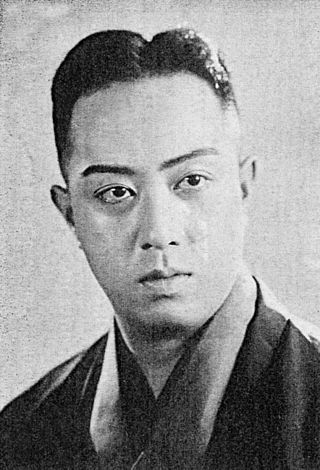
Kunitarō Sawamura was a Japanese kabuki and film actor.